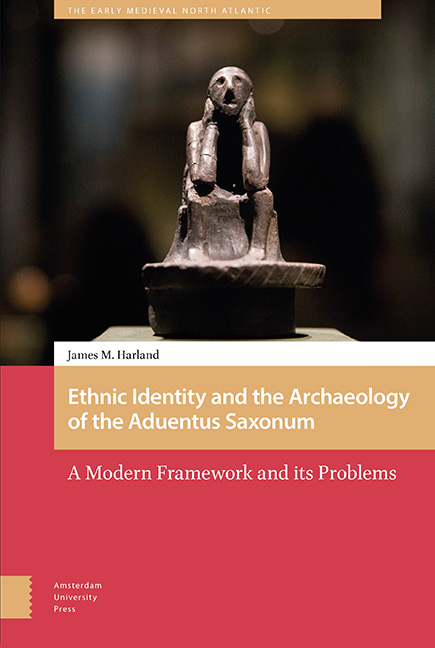Book contents
- Frontmatter
- Dedication
- Table of Contents
- List of Tables and Figures
- Acknowledgements
- 1 Introduction
- 2 Ethnicity and Archaeology
- 3 Empiricism and Metaphysics
- 4 Deconstructing Anglo-Saxon Archaeology
- 5 The Material Evidence Reconsidered
- 6 Building an Alternative
- 7 New Approaches and Final Reflections
- Appendix: Spong Hill Data
- Bibliography
- Index
7 - New Approaches and Final Reflections
Published online by Cambridge University Press: 16 December 2021
- Frontmatter
- Dedication
- Table of Contents
- List of Tables and Figures
- Acknowledgements
- 1 Introduction
- 2 Ethnicity and Archaeology
- 3 Empiricism and Metaphysics
- 4 Deconstructing Anglo-Saxon Archaeology
- 5 The Material Evidence Reconsidered
- 6 Building an Alternative
- 7 New Approaches and Final Reflections
- Appendix: Spong Hill Data
- Bibliography
- Index
Summary
Over the course of this book, we have encountered several critical fault lines in current approaches to ‘Anglo-Saxon’ archaeological scholarship that continue to guide scholars down avenues that limit our range of interpretative options. In particular, scholarship remains wedded to a ‘Germanic’ conceptual construct that entirely lacks an empirical basis in the contemporary source material. The interpretative frameworks of post-processualism and the Vienna and Toronto Schools have led to more critical theoretical treatment of this construct, and we have seen some Anglo-Saxon archaeologists venture so far as to reject it. Yet it remains a pervasive axiomatic principle on which Anglo-Saxon archaeologists rely in their analytical explanations. This is because the field continues to depend on interpretative approaches that reify the ethnic ‘group’ as the category for historical analysis. We have seen that even those scholars who recognise the analytical problems with this category have failed to reverse its popularity in Anglo-Saxon archaeological discourse. Chapters 3 and 4 proposed that this is the result of a positivist intellectual framework that privileges putative empiricism in realms of enquiry where it cannot be effectively applied. A post-groupist understanding of ethnic sociology shows us that archaeological analyses and questions of ethnic interpretation, whether in the positive or negative, are non-overlapping magisteria.
The alternative conception of ontology outlined in Chapter 3, and put to work in Chapter 6, enabled us to take a different approach. The case studies outlined how we can follow different interpretative avenues when we alter the questions applied to our material, provided we are honest about those points at which we have ceased to be empirical in our argumentation. In particular, these case studies have shown that acts of symbolic expression can be identified in early ‘Anglo-Saxon’ funerary ritual that relied upon new social conjunctures, sometimes drawing upon fragments of semiotic meaning originating, and perhaps therefore acting, as ideological expressions of Roman power. That is far from a novel proposition, nor do I claim it is one. The survival of Roman symbolism and ideology in post-Roman and early ‘Anglo-Saxon’ material has long been recognised.
- Type
- Chapter
- Information
- Ethnic Identity and the Archaeology of the aduentus SaxonumA Modern Framework and its Problems, pp. 257 - 274Publisher: Amsterdam University PressPrint publication year: 2021

